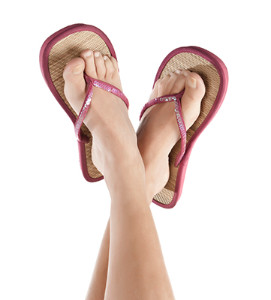 As the warm weather begins and the cold weather fades, many people begin their “spring cleaning.” Boots are stowed away and flip-flops become the trend. It may seem like a good idea to wear sandals, but there are risks associated with wearing flip-flops every day. Since there are typically no arches in flip flops, the feet may turn inward and the toes generally have to grip harder to ensure the shoe stays on the foot. Research has indicated that ankle sprains are the most common type of injury while wearing these types of shoes. This may be a result of a lack of support that can come from wearing shoes with an open back. If you would like additional information about how wearing flip-flops can affect your feet, please consult with a podiatrist.
As the warm weather begins and the cold weather fades, many people begin their “spring cleaning.” Boots are stowed away and flip-flops become the trend. It may seem like a good idea to wear sandals, but there are risks associated with wearing flip-flops every day. Since there are typically no arches in flip flops, the feet may turn inward and the toes generally have to grip harder to ensure the shoe stays on the foot. Research has indicated that ankle sprains are the most common type of injury while wearing these types of shoes. This may be a result of a lack of support that can come from wearing shoes with an open back. If you would like additional information about how wearing flip-flops can affect your feet, please consult with a podiatrist.
Flip-flops can cause a lot of problems for your feet. If you have any concerns about your feet or ankles, contact Dr. David Ungar from Personal Foot Care. Our doctor will assist you with all of your foot and ankle needs.
Flip-Flops and Feet
Flip-flops have managed to become a summer essential for a lot of people. While the shoes may be stylish and easy to slip on and off, they can be dangerous to those who wear them too often. These shoes might protect you from fungal infections such as athlete’s foot, but they can also give you foot pain and sprained ankles if you trip while wearing them.
When Are They Okay to Wear?
Flip-flops should only be worn for very short periods of time. They can help protect your feet in places that are crawling with fungi, such as gym locker rooms. Athlete’s foot and plantar warts are two common fungi that flip-flops may help protect your feet against.
Why Are They Bad for My Feet?
These shoes do not offer any arch support, so they are not ideal for everyday use. They also do not provide shock absorption or heel cushioning which can be problematic for your feet. Additionally, you may suffer from glass cuts, puncture wounds, and stubbed toes since they offer little protection for your feet.
More Reasons Why They Are Bad for Your Feet
- They Slow You Down
- May Cause Blisters and Calluses
- Expose Your Feet to Bacteria
If you have any questions, please feel free to contact our office located in Farmington, MI . We offer the newest diagnostic and treatment technologies for all your foot care needs.

